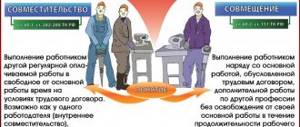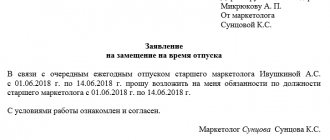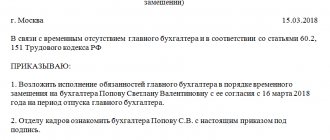The concept of “human factor” exists for a reason: in any office, an important employee can get sick, quit or go on vacation, and in this case it turns out that there is no one to cope with urgent work. In a situation where there are not enough workers in an office or enterprise, management can arrange for replacement or combination of professions. Contrary to misconception, these terms do not mean the same thing. How should each of them be interpreted and how does substitution differ from combination?
What is combination
According to the Labor Code of the Russian Federation, combining professions is “an expansion of service areas, an increase in the volume of work.” In practice, this means an additional burden on a certain employee, and the new actions that a person combining two occupations will have to perform may not coincide with the actions originally prescribed in the employment contract. That is, a person, as it were, gets another vacancy in his company - and, of course, receives a good reward for this. At the same time, he does not sign another employment contract and performs new duties during the working day - in his free time from the main workload.
When discussing work in two directions at once, one should distinguish between the terms “combining professions” and “combining positions.”
- The first is used to designate working specialties.
- The second applies mainly to management, as well as specialists and employees.
We can talk about combining professions if a person works, for example, as a carpenter and a painter, or about combining positions - if he is a manager and deputy head of a department rolled into one.
Despite the fact that an employee who decides to combine professions or positions should not enter into an employment contract again, such an initiative must be formalized.
If a boss wants to invite a subordinate to take on additional responsibilities, he must:
- coordinate changes with the staffing table;
- ask the employee to write an agreement;
- draw up a separate certificate of changes - it must be attached to the original contract;
- confirm the agreement by issuing an order.
Combination and temporary substitution
Combination and temporary substitution: decisions of the Cassation Board of the Supreme Court of the Russian Federation
S.Yu. Terentyev
,
lawyer
Published in the issue: Enterprise Personnel No. 7 / 2003
Temporary replacement
On November 1, 2002, the Supreme Court of the Russian Federation made a decision by which the complaint invalidating subparagraph "a" of paragraph 3 and paragraph 4 of paragraph 1 of the Explanation of the USSR State Committee for Labor and Social Issues and the Secretariat of the All-Union Central Council of Trade Unions dated December 29, 1965 No. 30/39 "On the procedure payment for temporary substitution”, approved by Resolution of the State Committee for Labor of the USSR and the Secretariat of the All-Union Central Council of Trade Unions dated December 29, 1965 No. 820/39, was left unsatisfied. And on March 11, 2003, the Cassation Board of the Supreme Court of the Russian Federation already considered a cassation appeal, which raised the question of canceling the above-mentioned court decision, with reference to the fact that the provisions of paragraph 1 of the said regulatory legal act regarding the prohibition on paying a full-time deputy or assistant to an absent employee, as well as the chief engineer, the differences between their official salary and the official salary of the replaced employee do not comply with labor legislation and limit the constitutional right of employees to remuneration for work, without any discrimination.










